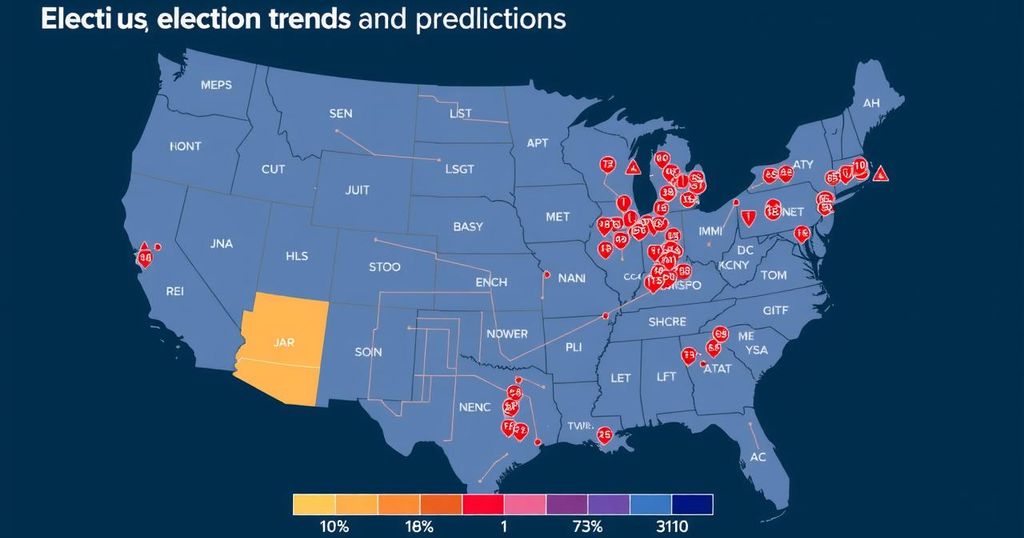World news
- SPIELVOGEL, AFRICA, AFRICAN NATIONAL CONGRESS, ASIA, COMMERCE DEPARTMENT, CONSERVATIVE PARTY, DEMOCRATS, DIA, DONALD TRUMP, ECONOMICS, ELECTION, EMMANUEL MACRON, EUROPE, GERMANY, GROVER CLEVELAND, INFLATION, JAPAN, KAMAL, KAMALA HARRIS, POLITICS, PRESIDENTIAL ELECTION 2024, SOUTH AFRICA, TRUMP, U. S
Marcus Chen
0 Comments
Election 2024: Incumbency under Scrutiny as Global Trends Loom
The 2024 U.S. presidential election approaches amid a global anti-incumbent trend that has seen numerous countries oust their ruling parties. Despite a strong economy, public sentiment in the U.S. remains unfavorable towards incumbents, creating uncertainty about the election’s outcome. Key factors influencing voter behavior and perceptions of electoral integrity are vital to watch as the election rapidly approaches. Both candidates, Harris and Trump, present starkly different platforms, signaling potential shifts in domestic and foreign policy depending on the election’s outcome.
The impending election in 2024 has emerged amid a global trend of anti-incumbency, where voters have recently dismissed ruling parties across multiple nations. Countries such as the United Kingdom, Japan, and South Africa have witnessed significant electoral shifts, raising the question of whether the United States will follow suit. At first glance, Vice President Kamala Harris might seem poised to defy this trend due to a strong economy. The U.S. has reported robust economic growth, low unemployment rates, and a high stock market, all indicative of a flourishing economic landscape. However, contrary to these indicators, public sentiment remains pessimistic, with many Americans expressing concerns about the state of the economy and the direction of the country. This ambivalence casts uncertainty on the outcome as the election approaches. Republican confidence is notably high, particularly in Donald Trump’s camp, which believes that polls historically underestimate his support. The possibility of undecided voters gravitating towards the challenger complicates predictions. Democrats, on the other hand, are hopeful that polling errors witnessed in past elections will not be repeated, recalling the unexpected Democratic gains in the 2022 midterms. As the elections draw closer, various factors could influence the outcome, including significant voter turnout, election integrity issues, and the event of legal disputes similar to those experienced in 2020. Recent developments indicate that millions of Americans have already cast their votes, complicating efforts to gauge voter preferences accurately. Additionally, the Supreme Court has recently made a contentious ruling regarding voter roll purges in Virginia, and foreign interference remains a concern, particularly with misinformation campaigns. Candidates have been actively promoting their positions leading into the final days of the campaign. Harris has framed her message around stability and a rejection of Trump’s leadership approach, while Trump emphasizes a return to his previous policies to foster economic growth and international stability. The implications of the election stretch beyond domestic concerns, eliciting reactions from global figures anticipating how the results will shape international relations and U.S. foreign policy. Should Harris secure victory, analysts suggest it may reinforce global democratic movements and alter perceptions around women’s leadership in governance. Public sentiment towards the examination of the election process reveals a noticeable divide between party affiliations, which may influence responses to any potential disputes following the election.
The article discusses the context surrounding the upcoming 2024 elections in the United States, amidst a global trend of voters rejecting incumbents. Various countries have seen the ruling parties lose power, leading to speculation about whether the U.S. will exhibit similar behavior. Despite a strong economic performance indicating favorable conditions for the incumbent, public pessimism raises doubts about whether Harris can maintain her position as Vice President. The article also touches upon the role of polling in influencing voter sentiment and predictions as the election date approaches, as well as the potential impact of foreign interference.
As Election Day rapidly approaches, the United States finds itself at a crossroads that may either align with the global wave of anti-incumbency or defy it. Factors such as public discontent, economic indicators, and the integrity of the electoral process will play critical roles in determining the outcome. Both candidates have laid out starkly contrasting visions for the future, ensuring a tense conclusion to the electoral campaign that has significant implications not only domestically but for global affairs as well.
Original Source: www.cfr.org




Post Comment